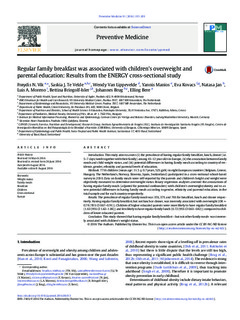Regular family breakfast was associated with children's overweight and parental education: Results from the ENERGY cross-sectional study
Vik, Frøydis Nordgård; te Velde, Saskia J.; Van Lippevelde, Wendy; Manios, Yannis; Kovács, Éva; Jan, Natasa; Moreno, Luis A; Bringolf-Isler, Bettina; Brug, Johannes; Bere, Elling
Journal article, Peer reviewed
Permanent lenke
http://hdl.handle.net/11250/2437037Utgivelsesdato
2016Metadata
Vis full innførselSamlinger
Sammendrag
Introduction. This study aims to assess (i) the prevalence of having regular family breakfast, lunch, dinner (i.e. 5–7 days/week together with their family) among 10–12 year olds in Europe, (ii) the association between family meals and child weight status, and (iii) potential differences in having family meals according to country of residence, gender, ethnicity and parental levels of education. Methods. 7716 children (mean age: 11.5 ± 0.7 years, 52% girls) in eight European countries (Belgium, Greece, Hungary, The Netherlands, Norway, Slovenia, Spain, Switzerland) participated in a cross-sectional school-based survey in 2010. Data on family meals were self-reported by the parents and children's height and weight were objectively measured to determine overweight status. Binary regression analyses assessed the associations of having regular family meals (adjusted for potential confounders) with children's overweight/obesity and to assess potential differences in having family meals according to gender, ethnicity and parental education, in the total sample and for each country respectively. Results. The prevalence of regular family meals was 35%, 37% and 76% for breakfast, lunch and dinner respectively. Having regular family breakfast, but not lunch or dinner, was inversely associated with overweight (OR = 0.78 (95% CI 0.67–0.91)). Children of higher educated parents were more likely to have regular family breakfast (1.63 (95% CI 1.42–1.86)) and less likely to have regular family lunch (0.72 (95% CI 0.63–0.82)) compared to children of lower educated parents. Conclusion. This study showed that having regular family breakfast – but not other family meals- was inversely associated with children's weight status.
